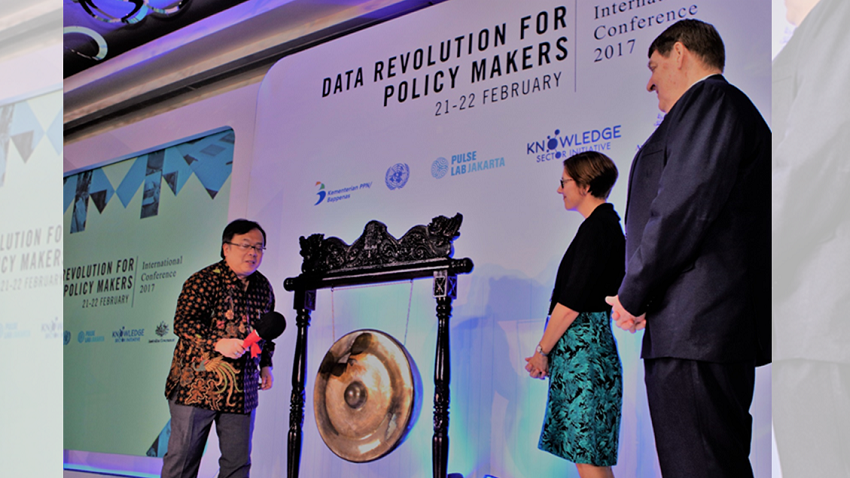by Ramadian Nugrahane
Pulse Lab Jakarta and the Indonesian Ministry of National Development Planning, in collaboration with KSI and the Government of Australia, hosted an International Conference, “Data Revolution for Policy Makers”, on 21-22 February 2017 in Jakarta. More than 300 researchers, policy makers, activists and data analysts, Government of Indonesia representatives, entrepreneurs, UN agencies and civil society organisations gathered at the conference, which took place under the theme of, “Expanding the Evidence Base: Government Demand for Advanced Data Analytics in Indonesia”.
Professor Bambang Brodjonegoro, the Minister of National Development Planning (Bappenas), affirmed the Government of Indonesia’s recognition of the importance of the data revolution in the policy-making process. “The ability of policy makers to take advantage of various data sources, including digital data, can help the government to make decisions faster and more accurately. High-quality data will provide the right and accurate information for policy makers to design, monitor and evaluate policies.”
The conference provided a medium to discuss the opportunities and challenges of using new data sources for policy makers, and to test technically sound and politically attainable solutions to inform policy decisions through data innovation. Indonesia, home to millions of users of digital technology, is one of the world’s richest sources of digital data. Commonly called ‘big data’ due to its quantity, diversity and speed of data collection, it opens endless new opportunities for policy makers, ranging from engaging citizens in collecting and analysing data to gaining new insights into our complex and evolving world.
According to a 2014 report by the Independent Expert Advisory Group to the UN, emerging technologies accelerate the increase of volume and types of available data, and thus develop unparalleled opportunities for informing and transforming society, as well as caring for the environment. This is the data revolution in which governments, companies, researchers and communities experiment, innovate and adapt to the new world of bigger, faster and more detailed data than ever before. In his remarks, the Director of UN Global Pulse, Robert Kirkpatrick, highlighted the urgency of using advanced data analytics for policy making. “Big data can transform how decision makers view problems and inform strategic decisions. Measuring and achieving progress toward the 2030 Agenda for sustainable development in today's digitally connected world depends in part on our ability to draw on new sources of real-time data and innovative technologies to inform policymaking.”
This is accompanied by efforts to better use existing datasets, including those owned by government, to yield richer insights. “Traditional ways of collecting data take a long time. Surveys are costly and focus groups are insufficient to capture the diversity of Indonesia,” said the UN Resident Coordinator for Indonesia, Douglas Broderick. He said that more diverse, integrated, timely and reliable information is needed. It can complement traditional sources of data to better inform decision-making processes. Justin Lee, the Deputy Head of Mission at the Australian embassy, said that data for policy “has the potential to address challenges of inequalities and development.”
The two-day event featured plenary sessions with senior representatives from government, the UN and public and private entities on seven themes: taking stock of the data landscape; taking the pulse applications of real-time data for decision making; the policy side of data innovation; synchronising and sharing data; forging data partnerships; reconfiguring citizen engagement and making sense of data. It includes interactive displays of citizen data collection, data visualisations, big data analysis and hands-on data innovation sessions facilitated by data experts. Petrarca Karetji, the Knowledge Sector Initiative’s Team Leader, emphasised the need to link data innovation approaches to the needs of policy makers. “We need to understand the drivers of demand for data analytics for policy makers, so that we arrive at solutions that are not only technically robust, but also implementable,” he said during the closing remarks.
All presentation materials of the conference can be downloaded at:
Social media highlights of the conference:
https://storify.com/PulseLabJakarta/data-revolution-for-policy-makers-conference-2017
Media coverage:
bisnis.tempo.co/bappenas-revolusi-data-sosial-mendesak-dilakukan
bisnis.tempo.co/dukung-e-government-pemerintah-terapkan-kebijakan-satu-data
finance.detik.com/rumuskan-kebijakan-pemerintah-jaring-aspirasi-publik-di-medsos
finance.detik.com/informasi-di-medsos-bantu-kendalikan-inflasi-ini-penjelasannya






